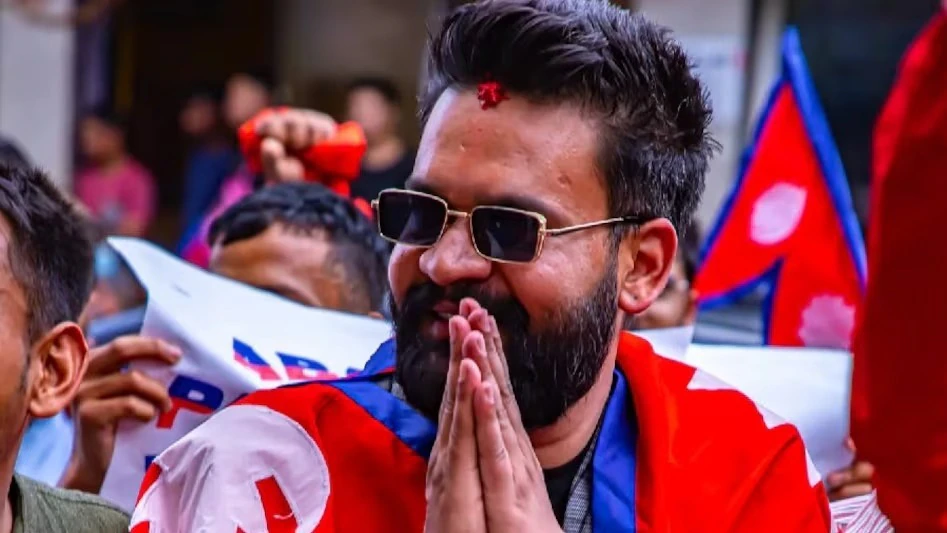Nepal is witnessing a dramatic political shift following the resignation of Prime Minister K. P. Sharma Oli in the wake of the deadly Gen Z protests. Among the names gaining momentum for leadership is
Who is Nepal PM – Balendra Shah?
Balendra Shah, popularly known as Balen—a rapper, engineer, and the independent mayor of Kathmandu. His rise from music to politics, his stance on corruption, and his strong youth appeal have made him a frontrunner in conversations about Nepal’s next Prime Minister.
Balendra Shah’s Early Life and Education
Balendra Shah was born in 1990 and pursued a degree in civil engineering. He later studied structural engineering at Visvesvaraya Technological University in Karnataka, India, giving him an educational link to the region. His academic training shaped his career as an engineer, but his passion for activism and music soon pulled him into public life.
Balendra Shah’s Music and Rap Career
Before entering politics, Shah was active in Nepal’s underground hip-hop scene. His rap lyrics addressed issues of corruption, inequality, and political dysfunction. Through music, he built a following among urban youth who saw him as a voice of resistance. This cultural connection laid the foundation for his later political success.
Balendra Shah as Kathmandu’s Independent Mayor
In May 2022, Shah contested the mayoral election of Kathmandu as an independent candidate. Defying traditional party structures, he won decisively, becoming the 15th mayor of Kathmandu and the first to hold the position without party backing. His victory symbolized a rejection of the political elite and a growing appetite for new leadership.
As mayor, he introduced reforms aimed at urban development, waste management, and anti-corruption measures. In June 2023, he stirred national debate by banning the screening of Indian films in Kathmandu after a controversial dialogue in the movie Adipurush, positioning himself as a defender of Nepalese cultural pride.
Balendra Shah and the Gen Z Protests
The deadly Gen Z protests, led by students and young workers, forced the resignation of Prime Minister Oli. During the unrest, Shah addressed youth demonstrators through a Facebook post, acknowledging their frustration but urging restraint. He emphasized that while their demand for leadership change had been met, the destruction of public and private property would only harm the nation. His measured appeal balanced solidarity with the youth and a call for responsible action.
Why Balendra Shah Is Seen as Nepal’s Next Prime Minister
Several factors make Shah a strong contender in the eyes of protesters and political observers:
- Youth appeal: At 35, he represents a generation closer in age and outlook to the Gen Z protesters.
- Independent image: His rise without party support reflects a rejection of entrenched political elites.
- Cultural connection: As a rapper and artist, he resonates with urban youth culture.
- Reformist reputation: His work as mayor projects him as a leader who delivers on governance.
- National symbolism: His ban on Indian films, though controversial, earned him visibility as a nationalist figure.
With protesters demanding accountability, Shah’s background outside mainstream politics offers a contrast to traditional leaders, giving him credibility at a time when the public seeks new faces.
Balendra Shah’s Message for Nepal’s Youth
In his post to demonstrators, Shah acknowledged their power in driving change, reminding them that preserving the country’s wealth and infrastructure was vital for their own future. His statement reflected a pragmatic tone, encouraging youth energy to be directed toward constructive reform rather than further violence.
Nepal’s Political Future Under Balendra Shah
If Shah steps into national leadership, it would mark an extraordinary transition for Nepal—from a rapper and independent mayor to potentially the country’s youngest Prime Minister. His ascent would also highlight the influence of Gen Z activism in reshaping South Asian politics.
The coming weeks will determine whether Shah’s candidacy can translate into a parliamentary mandate. For now, his name has become a rallying point for those calling for change, making him one of the most watched figures in Nepal’s unfolding political crisis.




